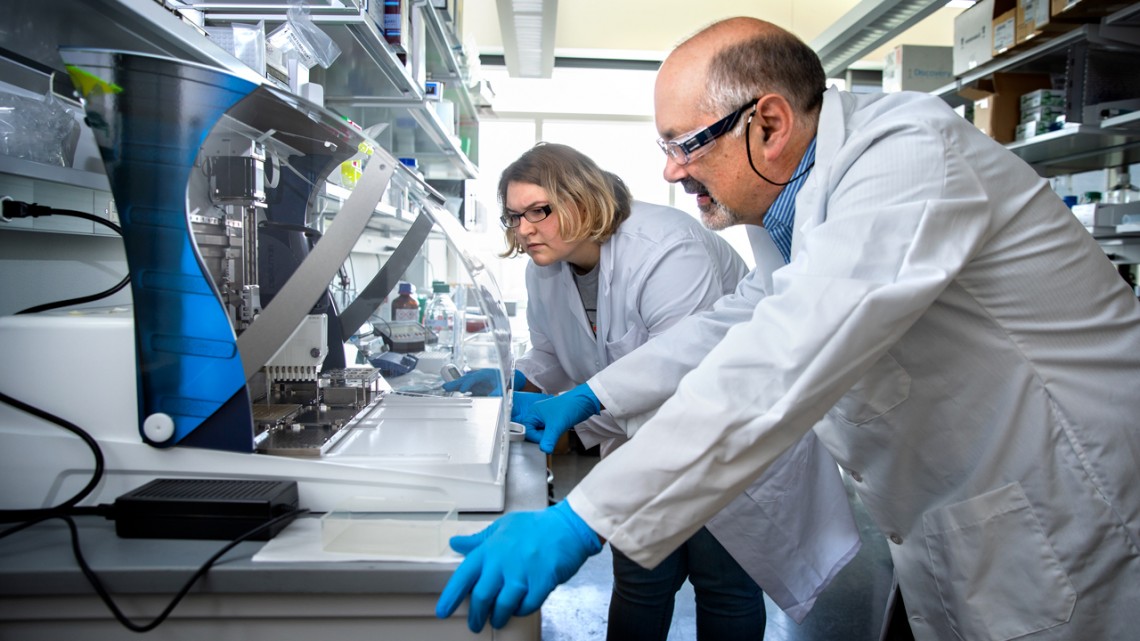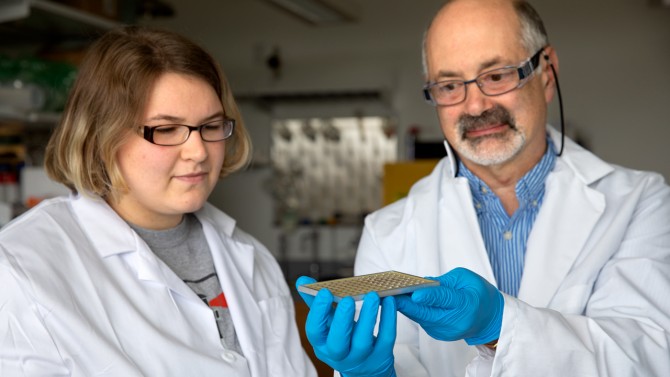
Sarah Poole and Joel Tabb of Ionica Sciences watch as samples are distributed onto a proprietary Lyme disease assay plate using an automated liquid handling system.
Rapid Lyme disease test may be available in late 2020
By Blaine Friedlander
The drawn-out process for diagnosing Lyme disease could become a thing of the past – good news for the thousands of people each year who get the tick-borne illness.
A new detection test created by Ionica Sciences – located at Cornell’s McGovern Center life sciences incubator – has been sparked by a FuzeHub grant to begin moving from the laboratory bench into approvals, production and doctors’ offices.
“For a long time, the medical community has wanted to detect Lyme disease directly, but the marker proteins are at very low levels and medicine has relied on tests of the body’s immune response – which sometimes takes weeks,” said Joel Tabb, president and co-founder of Ionica Sciences. “We have resolved this problem and can directly detect those markers in a very small blood sample. It’s a major breakthrough.”
Ionica Sciences, which joined the McGovern Center in 2014, has developed a serum-based assay called IonLyme that targets the blood protein Osp-A, which provides an active-protein “fingerprint” left behind by the bacteria that causes Lyme disease.
If a patient’s skin shows a rash resembling a bull’s-eye, the body’s response to Lyme disease has started. But confirmation of the disease can take weeks, since the body’s immune response usually has not reached detectable levels yet. New and old infections cannot be differentiated.
The new test uses an aptamer (a single-stranded DNA molecule) that binds with the Lyme disease target protein. A clinician places a patient’s blood sample on a proprietary surface that reacts with the target protein, where its presence is determined using a surface-enhanced Raman scattering spectrometer.
“This test is capable of finding a Lyme disease infection or reinfection quickly,” said Omar Green, chief executive office and co-founder. “Once you are exposed to Lyme, the antibodies can be present for decades; and once you are positive, it’s almost impossible now to determine if you were infected last week, last month, last year or in the 1990s. Our test also will be able to differentiate a fresh infection from an old one – a test that isn’t available to clinicians today.”
Tabb and Green believe the test could be available to doctors by late 2020. Before that, Ionica Sciences must complete its test validation with samples from Lyme patients, and then transfer the test to a qualified laboratory partner to make it available to clinicians, Tabb said.
Nationally, the majority of Lyme disease cases occur in the northeastern United States; the disease also has a heavy presence in Wisconsin and Minnesota. In 2017, a total of 42,743 confirmed and probable cases of Lyme disease were reported by the Centers for Disease Control and Prevention. Tabb said this CDC total number is likely an undercount, and there could be as many as 300,000 cases annually.
In 2017, Pennsylvania recorded the most confirmed and probable cases, at 11,900. New York was a distant second with 5,155 cases; New Jersey had 5,092.
Tick-borne diseases practically doubled from 2004-16, according to the CDC; Lyme disease accounted for 82% of all tick-borne cases.
“This is a strong proprietary test that can confirm Lyme disease and hunt for the proteins to determine if the disease is active,” said Lou Walcer, director of the McGovern Center. “This test will offer a valuable, certifiable service to doctors and their patients.”
Ionica Sciences received funding from the Global Lyme Alliance, a nonprofit Lyme disease research group.
FuzeHub is a non-profit organization that serves as the statewide New York Manufacturing Extension Partnership center, supported by Empire State Development’s Division of Science, Technology and Innovation.
Media Contact
Get Cornell news delivered right to your inbox.
Subscribe


